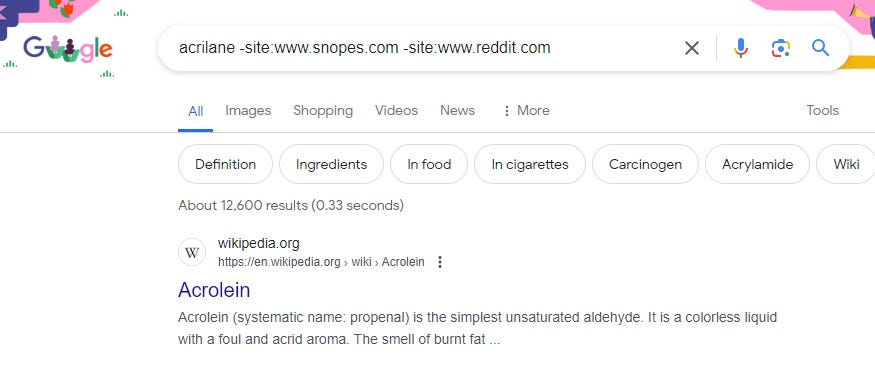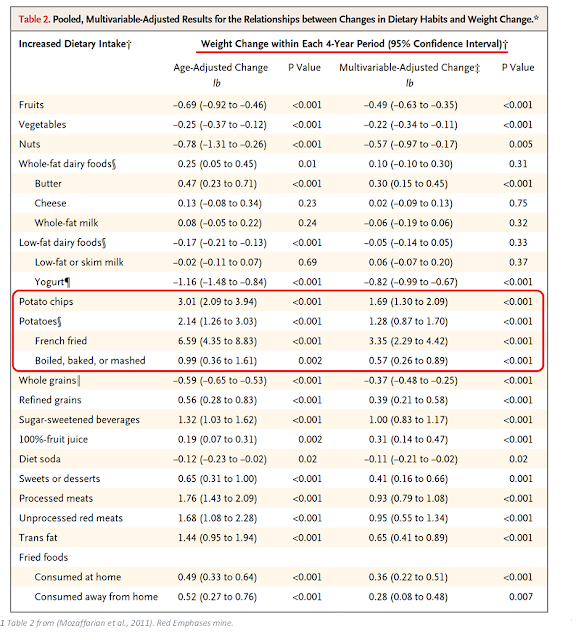Is an Order of French Fries Like a Pack of Cigarettes?
Can Snopes be trusted on seed oils? Yeah, fact-checkers ain't what they used to be, but can they use Google?
So apparently Dr. Paul Saladino recently made a video were he compared French fries to a pack of cigarettes. People on X got upset about this comparison.
While I haven’t seen the video in question, I pointed out that it was an accurate comparison (see below) and in the course of re-familiarizing myself with the facts, came across this link from Snopes.
"Do McDonald's French Fries Contain a 'Cigarette Ingredient' Called 'Acrilane'?"
"For starters, it's spelled acrylamide, not 'acrilane.'"
Don't you like the snotty tone? He must have an excellent source for this!
"First off, as one Facebook user pointed out, "there is no such thing as 'acrilane.'" A Google search for the word "acrilane" with quotes around it mainly produced results for street names in the U.S."
Wow, a Facebook user!
"In our research, we found that the unknown user who originated this rumor was most likely referring not to "acrilane," but rather to acrylamide, as at least one [Facebook] user noted."
Snopes has now got two Facebook users! Amazing, this research prowess. This is why we depend on Snopes!
Then the laughs continue.
"To learn more about this subject, we consulted with Lindsey Wohlford, a wellness dietitian at The University of Texas MD Anderson Cancer Center."
The last place to go is a dietician... You would want a toxicologist.
Sadly, however, Snopes and their Facebook user sources are wrong.
The word is indeed misspelled, but it's properly spelled 'acrolein', pronounced the same.
That would be this acrolein:
Snopes and Wohlford go on for some time about acrylamide—which is indeed found in fries, but not in levels high enough to worry about.
Acrolein, however, along with related compounds, is found in fries in levels high enough to warrant concern.
"Astoundingly, these estimated 154 g potato chip serving aldehyde levels are quite similar to those ingested during the smoking of a daily 25 tobacco cigarette allocation, for example crotonaldehyde (1.8–5.7 mg) and n-hexanal (2.5–9.5 mg), respectively [84]."
That's from Martin Grootveld, a toxicologist who has spent years researching this issue.
Acrolein is so toxic that the recommended exposure is lower than that of cyanide.
"Intriguingly, that for hydrogen cyanide (HCN) is 50 ppm, i.e., as much as 25-fold greater than that for acrolein [85]."
But how could Snopes have figured this out?
The key was mentioned right at the beginning:
“A Google search for the word "acrilane" with quotes around it mainly produced results for street names in the U.S.”
Why specify quotes around it? You only add quotes to a search term if using it without quotes isn’t returning the results you expect. The quotes forces the engine to find exactly the term specified.
What do you find if you remove the quotes?
Acrolein. It's the first result, to the Wikipedia article.
(I excluded snopes and reddit, which were the first two results—the article discussed and a reddit discussion about it.)
What can one learn from the Wikipedia article?
And:
As usual, Wikipedia isn’t the most reliable source (they don’t cite Grootveld), but it was better than the dietician or the Facebook users Snopes relied upon.
So it looks like Snopes was not just sloppy, but dishonest. That’s the only way I can interpret adding quotes, and not reporting on the simple query. The ‘journalist’ realized he didn’t have the story he wanted if he reported it straight.
So Snopes blew it on this one, citing lousy sources and consulting an 'expert' lacking the relevant expertise.
Who would want to hide the fact that fries contain toxins?
What Is The Most Fattening Food?
I came across this paper recently: "Changes in Diet and Lifestyle and Long Term Weight Gain in Women and Men” (Mozaffarian et al., 2011) From the illustrious New England Journal of Medicine.Thanks for reading Tucker Goodrich: yelling Stop! Subscribe for free to receive new posts and support my work.
References
Grootveld, M., Percival, B. C., Moumtaz, S., Gibson, M., Woodason, K., Akhtar, A., Wawire, M., Edgar, M., & Grootveld, K. L. (2021). Commentary: Iconoclastic Reflections on the ‘Safety’ of Polyunsaturated Fatty Acid-Rich Culinary Frying Oils: Some Cautions regarding the Laboratory Analysis and Dietary Ingestion of Lipid Oxidation Product Toxins. Applied Sciences, 11(5), 2351. https://doi.org/10.3390/app11052351
Hikisz, P., & Jacenik, D. (2023). The Tobacco Smoke Component, Acrolein, as a Major Culprit in Lung Diseases and Respiratory Cancers: Molecular Mechanisms of Acrolein Cytotoxic Activity. Cells, 12(6), Article 6. https://doi.org/10.3390/cells12060879
Liles, J. (2023, December 4). Do McDonald’s French Fries Contain a “Cigarette Ingredient” Called “Acrilane”? Snopes. https://www.snopes.com//news/2023/12/04/acrilane-and-mcdonalds-fries/










If you couldn’t trust two random unnamed volunteer factcheckers on Facebook, who could you trust? This is the wisdom of crowds, confirmed by a dietitian somewhere in Texas.
Serious question: how much less toxic are fries if I cook them at home with tallow? Which I do maybe twice a year.